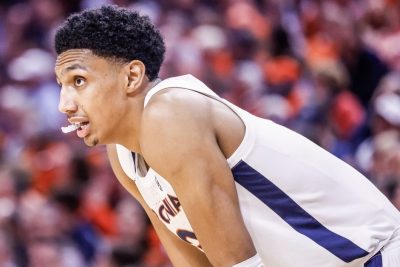Where has Virginia’s offense gone? Carolina uglies it up, breaks JPJ curse
By Jerry Ratcliffe
North Carolina had brought more celebrated teams to Charlottesville over the past dozen years and left town disappointed. Those teams found it unsettling not to race down the court at will, putting up big numbers.
They didn’t understand winning ugly. They didn’t grasp the concept that if you’re going to beat Virginia on its home court, then you’re going to have to ugly things up.
This Carolina team figured it out and walked out of John Paul Jones Arena with a 54-44 win on Saturday, ending the longest road losing streak to an opponent in Tar Heel history. Coupled with Duke’s loss to Wake Forest earlier in the day, 10th-ranked UNC took control of first place in the ACC.
Meanwhile, Virginia, mired in an offensive drought, was unable to score 50 points for the third-straight game, its longest such streak since 2019-20. The Cavaliers, 20-8, 11-6, held on to a shaky lead by half a game for third place over surging Wake Forest with two weeks remaining in the regular season.
For a blow-by-blow account, plus a full box score and notebook, see our game story here.
At one point in the first half Saturday, UVA had missed 22 of 23 shots.
The biggest concern for Virginia heading down the homestretch is rediscovering offense. Tony Bennett’s team has gone from a predicted No. 8 seed in the upcoming NCAA Tournament to a bubble team in an 11-day span.
Lack of firepower has been the culprit over that stretch. Even in a win over impressive Wake, the Cavaliers managed to score but 49 points.
Defense is powerful, but without offensive support, what good is it? Virginia is limited offensively and when those options are taken away, the Cavaliers are dead in the water, no wind for their sails.
Frankly, it’s surprising that it took this deep into the season for some opponents to figure that out. Remember UVA’s earlier struggles against Memphis, NC State, Wake Forest, all prior to the Cavaliers catching fire for an 8-game winning streak?
Those teams took away Virginia’s strengths. They refused to allow 3-point dead eye Isaac McKneely to beat them from downtown and wouldn’t let Reece Beekman drive at will to the basket.
All that changed when Jordan Minor found himself and gave UVA another option underneath and Jake Groves moved to his natural position, where he took pressure off McKneely by popping in 3-pointers at a high rate.
All of a sudden, Virginia’s offense revived and the Cavaliers were winning again. Until ACC coaches took a closer look at the earlier blueprints. Since then, UVA’s offense has been almost non-existent.
“They’re figuring some things out that are tough for us,” Bennett said.
Carolina coach Hubert Davis knew exactly what his team had to do in order to survive its trip to JPJ: limit Beekman and contain UVA’s 3-point shooters, McKneely and Groves.
Sound familiar?
“Virginia is one of the best teams in the country, and we tried to defend them in a way where we can take away those 3-point shots from their best 3-point shooters and make them put the ball on the floor,” Davis said in his postgame.
Check.
Virginia made 2 of 14 shots from beyond the arc. McKneely was 1 for 5. Groves 0 for 1.
Then, keeping Beekman from straight line-driving to the rim, limiting his penetration.
“I mean, he’s their best finisher,” Davis said. “He’s really aggressive in transition ball-screen action, his ability to be able to get to the rim and able to score and also distribute, so I thought we did a really good job of contesting his shots when he drove into the lane, making him make tough 2’s, contested floaters.”
Check.
Beekman was Virginia’s offense, scoring 10 points, dishing out 5 assists, some to Minor, who led UVA with 12 points. Still, as aggressive as Beekman was, he was 4 for 14, all but one of those shots coming in the paint.
Combine McKneely, Groves and Beekman’s shots together and they were a collective 6 for 26. Everybody else on Virginia’s roster went a combined 10 of 32 (5 of those were from Minor).
Still, as bad as Virginia was offensively, Carolina wasn’t much better. Both teams made 16 field goals. The difference was Notre Dame transfer Cormac Ryan, who went 6 for 11 from Bonusphere and led all scorers with 18 points. It was Ryan who gave UNC separation in the first half when he was 5 for 8 from the arc as the Tar Heels took a 26-16 lead at the break.
“Cormac, I mean it’s an amazing performance,” said Carolina center Armando Bacot. “When he’s shooting the ball like that, that’s hard to beat us. For him to pick up the offensive end when me and RJ (Davis) didn’t have the biggest game offensively, especially in the first half, shows the depth of this team.”
Bacot was on the bench for nearly the last 13 minutes of the first half with foul trouble and finished the game with 10 points and 13 rebounds. Davis, the ACC’s leading scorer, didn’t make a bucket until the 13:45 mark of the second half, his only field goal of the game.
“I was just trying to make it difficult for him on every play,” said Beekman, who held the likely ACC Player of the Year to a 1-for-14 shooting performance. “He’s a great player, great shooter, so yeah, I just wanted to make it hard for him throughout the whole game.”
Had Virginia’s defense not been so efficient, Carolina might have had its way with the Cavaliers. As ugly as things were, UVA still had a chance to cut the UNC lead to only three points with 1:50 to play.
The Tar Heels led 47-42, but Minor went to the line for a one-and-one and missed the front end. Harrison Ingram scored on a wide-open layup on a designed play during a timeout following Minor’s miss, putting the game away. Davis said later that UNC took advantage of Ryan’s 3-point threat, spreading UVA’s defense, to open a lane for Ingram’s layup.
Davis clearly understood coming into the game that Carolina wasn’t going to break its losing streak in Charlottesville by playing traditional UNC basketball. The Tar Heels were going to have to ugly things up, just like Virginia.
Play defense, rebound, fight for loose balls.
“We consistently said to each other, whatever it takes on both ends of the floor,” Davis said. “Whatever it takes.”
It required winning ugly, which is usually Virginia’s thing. This time around, Virginia was just ugly.









